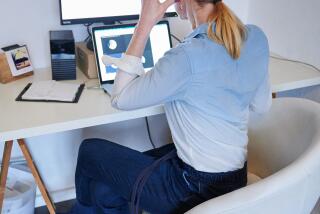Zzzzzzzzzzz
- Share via
So you walk into the boss’ office and say:
So, boss, I have a great idea, one that will significantly increase my creativity, energy level and output, and it will only take about 20 minutes a day.
So the boss--being supremely interested in anything that will get your posterior in gear--asks about this grand idea.
So you say: I want to take a regular afternoon nap.
The subject, of course, is never brought up again.
But maybe you took the wrong approach. Maybe you should have pointed out that JFK, Winston Churchill, Napoleon, Brahms, Salvador Dali, Da Vinci and Thomas Edison all napped at work. And they did OK.
Or maybe you should have mentioned the work of Boston University professor William Anthony, author of two books on napping:
“The Art of Napping,” in which he makes a case for a regular daily doze, and “The Art of Napping at Work,” which he co-wrote with his wife, Camille.
“When I wrote the first book, I put in a comment about how my wife napped at work on her boss’ couch,” Anthony says. “I got such a response from that, I figured I must be tapping into something.
“Americans used to get almost 10 hours of sleep a night before the invention of the lightbulb. Now the average is under seven hours.”
Anthony believes the workplace nap is good for both the employee and the employer.
“There are all sorts of problems related to lack of sleep at work,” he says. “But for some reason we see productivity and napping as being at opposite ends of the spectrum when they actually go hand in hand.”
*
A 1997 poll by Louis Harris and Associates addressed the relationship between performance in the workplace and sleep-deprived workers.
It found that on less than eight hours of sleep, people reported their concentration was only 70% of normal, they accomplished only 76% of their capacity, and the quality of their work dropped off by 20%.
Add to that a survey released by the National Sleep Foundation in March that showed that only 35% of adults get the recommended eight hours of sleep a night.
Despite growing evidence to the contrary, the catching of a few winks at work is still seen as nothing more than sleeping on the job.
“Many employers think someone naps because they have stayed up late or have unhealthy habits,” Anthony says, “rather than they are napping because it’s good for them.”
Although they are a distinct minority, some companies are waking up to the realization that when employees snooze, employers don’t necessarily lose. One of them is Yarde Metals in Bristol, Conn., which has allowed for eight napping rooms in its planned new headquarters.
“When we did a survey for our new building, 50% of our employees said they would use a nap room between one and five times a week,” says company President Craig Yarde.
*
“We aren’t going to turn off the phones or shut down the machinery so people can take naps en masse,” Yarde says. “Napping will be self-regulated by peer pressure, which is in keeping with our company philosophy of treating everyone with dignity and respect.”
Anthony says companies that are receptive to napping are generally geared to trying to keep their employees happy. That would seem to fit Yarde Metals, where napping rooms in its new headquarters will be accompanied by a day-care center, an exercise room and a kennel.
Interestingly, while older people get a bad nap rap, more 18- to 29-year-olds (41%) than 30- to 64-year-olds (35%) admit to napping at least once during the workweek, according to the sleep foundation’s poll.
So maybe it isn’t so surprising that, as a group, upstart high-tech companies run by young people--35 and under--tend to be more nap-friendly. Anthony says these companies are often of the view that their people work long hours and that if they need to recharge, so be it.
If Anthony had his way, naps would be company sanctioned and considered no different than coffee, cigarette or lunch breaks. Although he doesn’t see that happening any time soon, he is optimistic.
“The work culture does change,” he says. “We now have casual Fridays; women can wear slacks to work; there is no longer smoking in the workplace. So napping at work is not a pipe dream.”
More to Read
Inside the business of entertainment
The Wide Shot brings you news, analysis and insights on everything from streaming wars to production — and what it all means for the future.
You may occasionally receive promotional content from the Los Angeles Times.










